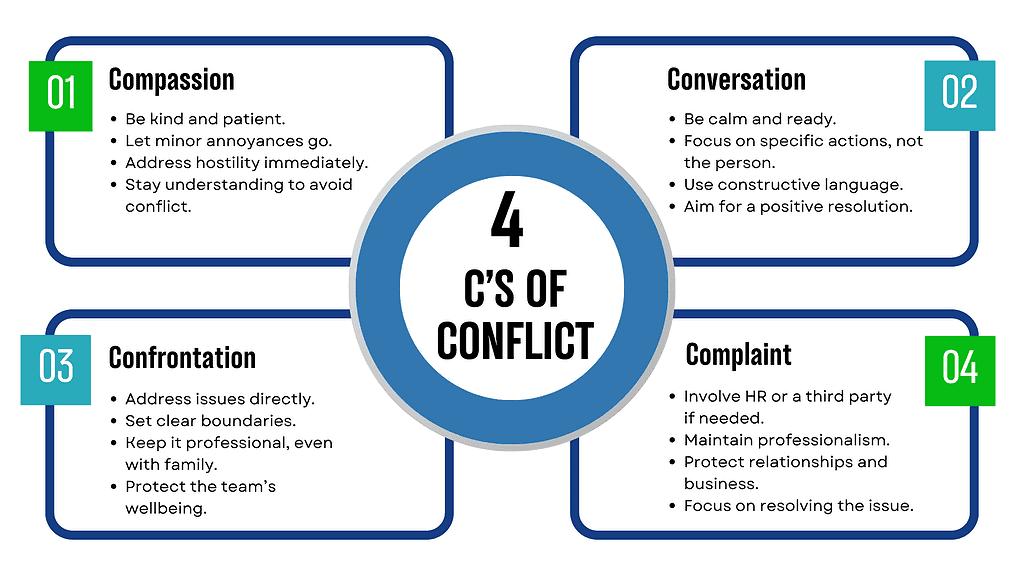Running a family business can be a dream, but let’s be honest—there are some unique challenges that come with it. One of the trickiest? Employee conflict. Whether it’s between family members or non-family staff, dealing with workplace tension is part of the deal. And in family businesses, the situation gets even more complicated because personal and professional relationships often overlap.
So, what’s going on when these conflicts arise? A lot of the time, it’s about poor communication, a lack of emotional awareness, or people not handling social dynamics well. These issues might start small, but when there’s no clear process for conflict resolution in family business, they can quickly turn into massive rifts among employees
We’ve seen these struggles firsthand and have worked with plenty of family business owners to help manage them. A lot of what we do centers around improving team culture and helping everyone communicate more effectively. That’s key when your workplace isn’t just a team of employees, but also a family.
What Causes Conflicts in a Family Business?

The real trouble starts when people aren’t aware of how their behavior is affecting others. Someone says something that rubs another person the wrong way, and instead of talking it out, one person stews in silence or gets passive-aggressive. Even worse, they may go to the boss (who’s often a family member) and expect them to sort it out.
This is particularly tricky in family businesses. The owner might have to juggle being a leader, a manager, and a family member all at once. It can leave everyone feeling a little stuck or unsure about how to handle things without making it awkward. Over time, these tensions can chip away at team morale and culture, which is extra hard in family businesses where personal relationships often make it feel more… personal.
A Real Struggle for Family Business Leaders
Imagine a family business owner, clearly frustrated, joking that he felt like he was running an adult daycare rather than a business. It’s a sentiment that many family business owners can relate to. Without a clear strategy for managing conflict, things can quickly get out of hand—especially when family dynamics are involved. What starts as small issues can easily spiral into bigger problems, creating tension and disrupting the whole team.
It’s crucial to take action when there’s clear harassment or bullying, but the reality is that most issues we see in family businesses stem from poor social skills, self-promotion, and not paying enough attention to how others are impacted. And yes, sometimes, there are deeper family tensions that spill over into the workplace.
The 4 C’s of Conflict Resolution for Family Businesses
Here’s where things can turn around. Experts rely on a method called the 4 C’s of conflict resolution, and it’s been a game-changer for our clients in family businesses.

1. Show Compassion
It all starts with being kind. In family businesses, where many of the relationships have been around long before the business, this is especially important. You don’t need to be best buddies with every team member, but you should always approach things with respect and patience.
When someone’s behavior annoys you, take a step back. Ask yourself if it’s worth bringing up, or if you can let it go. If someone is harassing or being openly hostile, then that needs to be addressed immediately. But if it’s something small—like a comment that rubbed you the wrong way—sometimes the best response is to be patient and move on. It doesn’t hurt to be understanding and not let little things drag you into unnecessary conflict.
2. Start a Conversation
If the issue doesn’t go away on its own, you’ll need to have a chat with the person involved. And, of course, you need to be calm and respectful about it. Make sure you’re in a good place emotionally before you bring it up.
For example, instead of saying “You always do this and it’s so annoying,” try something like this:
“Hey, can I talk to you about something? I really appreciate the work you do, but when you said [specific comment], I felt really uncomfortable. I’d like to figure out how we can avoid that in the future.”
This way, you’re addressing the issue without being confrontational. And it’s crucial to remind the person that you’re trying to keep things good for the team and the business.
3. Confrontation (When It’s Necessary)
If the behavior continues after that conversation, it might be time for a more direct approach. Don’t let it slide. Confrontation isn’t a bad word—it just means stepping up and addressing things head-on.
Be clear and firm, but keep your tone compassionate. This is where you draw boundaries and explain what’s at stake for the team and the business. If it’s someone you’re related to, remind them that you need to be able to separate personal issues from the workplace.
4. Handle Formal Complaints
When things get really out of hand, and conversations or confrontations haven’t worked, you might need to bring in a third party. This could be someone from HR or even an external consultant. It can feel uncomfortable in a family business, but keeping the peace and making sure everyone stays respectful is more important than letting things fester.
When emotions get out of control, it can break down relationships and hurt the business. Don’t let that happen. With the right approach—humility, compassion, and clear boundaries—you can protect the business and your relationships.
Final Thoughts
At the end of the day, family businesses succeed when the culture is strong. That means every employee—family and non-family members alike—needs to prioritize communication, respect, and a healthy approach to conflict. When you keep those things in mind, it leads to a more positive environment where everyone can thrive.
Balancing family relationships with running a business is challenging, especially when conflicts arise. If you’re facing tension between family and non-family employees or want to set up better systems for resolving conflicts, we can help. An outside perspective might be just what you need to keep things running smoothly and ensure everyone is on the same page.

Ready to Strengthen Your Family Business?
At Family Owned Business Coaching, we specialize in helping family-owned businesses manage conflicts and build stronger, more cohesive teams. Whether you’re dealing with employee tension or looking to improve communication, Glenn Smith and his expert team are here to guide you every step of the way.
Want more tips? Dive into our blog for expert advice on navigating family business challenges. And don’t forget to explore our Leadership Development and Management Training pages to see how we can help you develop the skills needed for long-term success.
Get in touch today with Glenn Smith to start building a thriving, successful family business!

